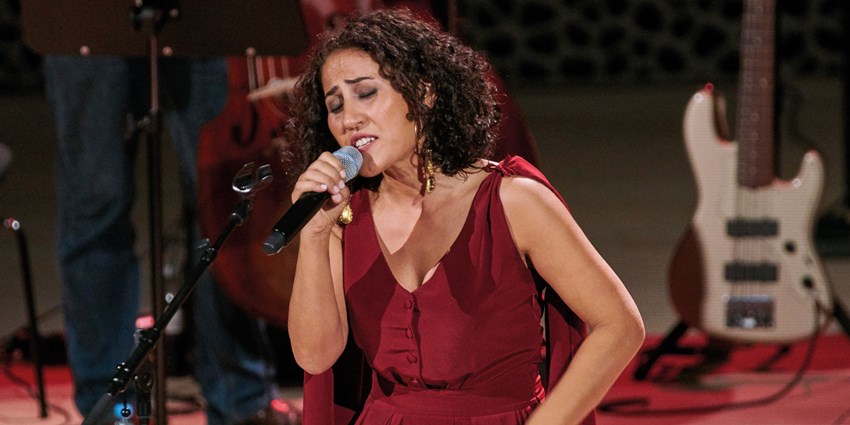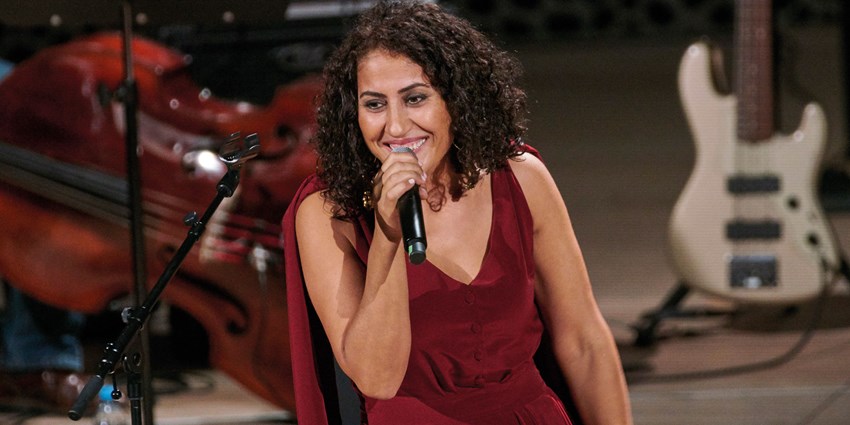Friday, September 4, 2020
Aynur: Solace in Exile
The Kurdish singer Aynur Doğan has released her first solo album while living in exile in the Netherlands. She tells Robert Rigney her reasons for leaving Turkey and her mission to keep Kurdish songs alive

Aynur (photo: Muhsin Akgün)
Like many people from the West, my first exposure to the amazing vocal prowess of Aynur and her captivating persona was Fatih Akin’s 2005 Istanbul music documentary film, Crossing the Bridge: The Sound of Istanbul. In it Aynur sings a haunting, dirge-like Kurdish lament in an Ottoman-era hamam, plucking brittle saz lines alongside a deep and resonant oud. Later, she speaks to the camera about the sorry state of Kurdish rights in Turkey, and how, at a recent show, she had been heckled by right-wing youths, who stormed the stage, forcing the saz from her hands.
The film brought Aynur some new and unexpected fans from the ranks of Hollywood and Anglo-American rock’n’roll. Thanks to the endorsement of Akin, Martin Scorsese and Keith Richards became acquainted with Aynur, and in 2010 at Emir Kusturica’s west Serbian ethno-village film and music festival in Küstendorf, Akin spoke at length about the two celebs’ enthusiasm for the Kurdish singer. Later, after a concert at Küstendorf, Johnny Depp (a friend of Kusturica’s and leading man in his indie film, Arizona Dream) struck up a conversation with Aynur, asking her questions about Kurdish music.

Aynur playing at the Elbphilharmonie in Hamburg in 2017 (photo: Claudia Höhne)
Well, in the 15 years since Akin’s acclaimed film debuted, the restrictions on Kurdish language in public life have eased, yet the situation in east Anatolia remains tense. One hears news of ‘neutralised’ Kurdish PKK fighters and ‘martyred’ Turkish soldiers on a regular basis in the Turkish media.
One year before the Taksim Gezi Park clampdown in 2013, Aynur left Turkey to settle in Amsterdam for good, citing political reasons as well as a changed musical climate in Istanbul. Things had finally come to a head at the Istanbul Jazz Festival in 2011 when Aynur was shouted off the stage for not singing in Turkish. The incident became a cause célèbre for the press, and in the midst of a media furore, Aynur decided to move to Amsterdam, where she claims that she has not been hassled because of her nationality, and where she enjoys a welcome measure of anonymity. From her position of exile she has released her seventh album, Hedûr: Solace of Time (reviewed in #159), an album that straddles the mountains of east Anatolia and the Western world of classical harmonies.
Aynur continues to be lionised by the European press, finding in her a potent symbol in the cause of the Kurds – after Bosnians, Albanians – now Europe’s latest fetish.
Not long after the release of Hedûr, I catch up with her, stranded in Istanbul, caught in limbo between gigs cancelled as a result of national mourning in memory of 33 ‘martyred’ soldiers in Idlib, Syria in February, and the latest coronavirus restrictions. “So we are staying here in Istanbul for the moment, just waiting,” explains Aynur.

There are certain questions Aynur constantly has to field from journalists, it seems. Perhaps the most common is whether she considers herself a political creature. “I get [asked] this question all the time,” she says. “I see myself primarily as a musician. I am not a politician. But being political can be something else: supporting culture; or supporting women; supporting minorities around the world; or supporting music.”
Aynur sees her quest to keep Kurdish music alive as both deriving from a deep seated subjective need as well as stemming from a political motive. She may love Turkish songs – or songs from around the world, for that matter – but she sees it as her personal life’s mission to sing, and keep on singing, in Kurdish. “Singing in Kurdish is a way of bringing our history or our culture from the past to the future, for the next generation. I am trying to maintain this bridge.” She continues, “It is necessary for humanity. Some of these songs are at least 300 years old. It is important that they are liked by the next generations.”
The key to Aynur’s music is her bucolic childhood spent in the mountains of east Turkey, where she lived until she was 18. In later years, amid the din of Istanbul and the traffic seething streets, she would return to her old Anatolian rural memories, taking strength and solace from the sights, and particular the sounds of Çemişgezek, a small Alevi mountain town in the Tunceli Province of east Turkey, where she was born in 1975.
Aynur recalls that back then she developed a sharp ear. She listened to everything, sang every song she heard. Songs were all around her – mainly Alevi songs. Unlike Sunni Muslims, the Alevis have no Qur’an; no holy book. Songs have the role of passing stories on from ear to ear, from generation to generation. The songs – courtship songs, wedding songs, funeral songs – are there from one’s birth.
In 1992 Aynur’s parents took her and fled to Istanbul in the wake of heated conflicts between the Turkish military and the PKK. The family settled in a European-side suburban district of Istanbul. Her father ran a small bakkal (a grocery shop) and her mother cared for the kids. Aynur recalls being aware of her Kurdish and Alevi identity for the first time. Initially she tried her best to conceal who she was and blend in with her Turkish friends and neighbours. Later, while studying saz – or bağlama, to be precise (a type of thin-necked lute) – and türkü (folk) singing at the Arif Sağ Music (ASM) school, she devoted herself to the Kurdish music of her childhood.

Aynur (photo: Claudia Höhne)
In 2002 she cut her first album, Seyir. She performed concerts, collaborated with groups like Metin & Kemal Kahraman, Grup Yorum, Anjelika Akbar and Orient Expressions. Two years later Keçe Kurdan (Kurdish Girl) was issued on the Kalan label. It was a collection of Kurdish and Turkish folk songs, accompanied by traditional instruments, like saz, oud and daf, and interspersed with a subtle dash of sombre, down-tempo electronica.
Aynur came in for a spot of controversy on the release of Keçe Kurdan, which was banned briefly in 2005. According to a court in Diyarbakır, the songs encouraged young Kurdish women to leave their partners, go to the mountains and join the PKK. “That was nonsense of course,” she says. “On the contrary, the song was a call for women’s rights, for women to be aware of her rights and fight for them – but not with the sword. It’s more of a feminist call.” The following year the ban was lifted.
That same year she appeared with her band in a meyhane scene in Yavuz Turgul’s film Gönül Yarası (Lovelorn) – a film about a retired teacher who leaves the barren and sun-baked Kurdish provinces of east Anatolia, and comes home to Istanbul to become a cab driver, and – in a plot twist that smacks a bit too closely of Martin Scorsese – befriends and saves a nightclub singer from her obsessive/abusive boyfriend, only to have the whole story end tragically at the barrel of a gun.
Significantly, the film and the segment involving Aynur, became a cinematic milestone insofar as Aynur became the first artist to sing in Kurdish in a Turkish film.
She recalls the period around cutting her first album as a heady and exciting time. Istanbul was thawing out. Restrictions on Kurdish language in public life were relaxing. She was revelling in Istanbul’s new-found multiculturalism, even performing in front of then prime minister Recep Tayyip Erdoğan. To be sure, there were a lot of positive changes for Aynur since her 2002 breakthrough. In 2004, Turkey’s public television, TRT, began broadcasting in Kurdish, thus effectively ending the ban on the use of Kurdish in public life.
On the other hand Erdoğan’s quest for a more pronounced Islamic culture in Istanbul began to be palpably felt in the nightlife of Taksim (Istanbul’s once lively clubland), affecting Turks and Kurds across the board, with a ban on the sale of alcohol outdoors, and finally the quashing of opposition expression in Taksim, culminating in the defeat of the Gezi park protests in 2013. All this motivated Aynur in her decision to seek her fortune abroad.
Hedûr is Aynur’s first solo album produced in exile. The title refers to a Kurdish word, for which, evidently, there is no pat English translation, but that is construed on the album cover as Solace of Time. “We use it in some certain situations,” explains Aynur. “It makes you think about how the time is passing. Therefore you need to work or be busy with some things. It could be painting, it could be writing. Not to be idle, doing nothing. But to do something that makes you happy. This is hedûr.”
Her decision to relocate to Amsterdam in 2012 is reflected here sonically in a rapprochement with Western harmonic forms. One song features the tanbur, but the saz is totally absent on this latest album. Instead, prolific use of rippling piano, dramatic orchestral touches, the odd choral moment and Western harmonies in general prevail – but unobtrusively, maintaining a respectful distance, as a kind of ethereal, yet nondescript, incidental easy-listening vibe so as not to impinge upon Aynur’s spectacular singing.
Aynur’s voice – by turns exuberant, soaring, bluesy and plaintive – intoning texts in her native tongue, overrides everything, keeping the songs anchored in a Kurdish genius loci. “I was trying to find a balance and trying to keep your source and your tradition also and your feeling of not disappearing amidst these new instruments and this new music – doing something to balance it, to equalize it.” I ask her where this experimentation with Western modes is leading. Ultimately she says she is striving for a sound beyond East and West. “It’s just music that I’m after. You know what I’m saying?”
Be that as it may, her real affinities, whether they are for Eastern or Western music, are articulated in the selection of music she listens to in private. “I like mostly the old traditional Kurdish artists,” she says. “Many of them are not alive. There are some dengbêjs (singing Kurdish storytellers) that I like to listen to: Dengbêj Şakiro, Şeroyê Biro, Karapetê Xaço. They are really nice interpreters and singers. Without any instruments, they are just singing and explaining stories and history and all the stuff that we learn about in Kurdish culture.”
She stresses that she listens to non-Kurdish music as well and currently she’s listening to music from Mali and Georgia, as well as to Western classical music and jazz. “I don’t know much about Anglo-American music,” Aynur admits. “I listen more to traditional stuff from around the globe. I listen by chance and then I like it and continue.”
Somewhat surprisingly, Aynur claims that, despite progress made in Turkey, she is still struggling as a Kurdish artist. While she has just received an invitation to perform at Carnegie Hall in the US, she gets no government or municipal support and has to make do with ticket sales alone. “Of all the Kurdish artists in Turkey I am the one who maybe one would think would have it the easiest,” she says. “But no – I’m still struggling.”
Listen to Hedûr - Solace of time
This interview originally appeared in the August/September 2020 issue of Songlines. Never miss an issue – subscribe today!

